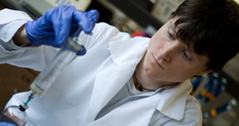Chairperson: Kristina M. Ropella, Ph.D.
marquette.edu/engineering/biomedical/grad.shtml
Degrees Offered
Master of Science, Master of Engineering; Doctor of Philosophy
Mission Statement
The Department of Biomedical Engineering is a dedicated team committed to the Jesuit tradition of the pursuit of truth. We develop leaders and problem solvers skilled at applying engineering, science and design principles to improve health in the service of humanity by:
- Discovering and disseminating new knowledge;
- Promoting critical thinking and lifelong learning;
- Guiding students to meaningful and ethical professional and personal lives;
- Fostering interdisciplinary and collaborative research and education through academic and industrial alliances;
- Continuing innovative leadership in education, research and industrial relationships; and
- Inspiring faculty and students to serve others.
Specializations
M.S: Bioinstrumentation/Computers, Biomechanics/Biomaterials, Rehabilitation Bioengineering, Systems Physiology
M.E.: Biocomputing, Bioimaging, Bioinstrumentation, Biomechanics, Biorehabilitation
Ph.D.: Bioinstrumentation/Computers, Biomechanics/Biomaterials, Functional Imaging, Rehabilitation Bioengineering, Systems Physiology
Program Descriptions
The biomedical engineering program is interdisciplinary in nature, involving the application of engineering and mathematics to the solution of problems related to medicine and biology. The faculty reflect this interdisciplinary nature in their courses and research. Marquette faculty are synergistically complemented by adjunct faculty from the Medical College of Wisconsin. The MU/MCW Center for Biomedical Engineering and Biomathematics fosters collaborative interactions between the two institutions. Research can be characterized by the general areas of bioinstrumentation/computers, biomechanics/biomaterials, rehabilitation bioengineering and systems physiology. More specific areas of research include: artificial limbs/prostheses, biomaterials, biotelemetry, cell transport and metabolism, cardiac electrophysiology, computers in medicine, functional imaging (magnetic resonance, X-ray), head and spinal cord trauma, hemodynamics, human motion analysis, medical and biological image analysis, physiological signal processing, rehabilitation engineering, systems physiology (cardiovascular, gastrointestinal, musculoskeletal, neuroscience, pulmonary), telerehabilitation, tissue engineering, hard and soft tissue biomechanics and transcutaneous power transfer.
Functional Imaging Specialization — MU/MCW Joint program
Functional imaging is the simultaneous quantification of the structural and functional aspects of a biological system. Modern X-ray, nuclear magnetic resonance and other means of imaging in relatively noninvasive ways have made functional imaging increasingly practical. The doctoral program in functional imaging, a collaborative effort between Marquette University and the Medical College of Wisconsin, trains students in the use of these new technologies to obtain high-resolution structural, kinematic and kinetic data from intact organs, and in the use of mathematical modeling to understand the organ physiology.
Special registration for this program is required, as courses are taken at both institutions. Students must register for the course BIEN 6947 Medical College of Wisconsin/FUIM-Joint Degree through Marquette University and for the matching MCW course through Medical College of Wisconsin.
Prerequisites for Admission
Students with backgrounds in engineering, physical science and life science disciplines are eligible for admission to the master of science, master of engineering and doctoral programs in biomedical engineering. A baccalaureate degree in an appropriate area with a minimum grade point average of 3.000 is required. For the master of engineering, at least one year of post-baccalaureate professional work experience is required prior to starting the program. Applicants who do not have an engineering degree must complete prerequisite engineering requirements. The list of prerequisites can be obtained from the department office.
Application Requirements
Applicants must submit, directly to the Marquette University Graduate School:
- A completed online application form and fee.
- Official transcripts from all current and previous colleges/universities except Marquette.
- Three letters of recommendation.
- GRE scores (General Test only).
- A brief statement of purpose that includes the proposed area of research specialization.
- (For master of engineering applicants only) an interview with the M.E. program director.
- (For international applicants only) a TOEFL score or other acceptable proof of English proficiency.
General Information
All admitted students are required to obtain and read the department’s Graduate Student Handbook, which contains complete details about the biomedical engineering programs and additional departmental degrees. This handbook is available through the Biomedical Engineering Office (414) 288-3375 and website at marquette.edu/engineering/biomedical/grad.shtml.
Accelerated Bachelor’s-Master’s Degree Program
This program allows Marquette University students to earn both their master of science degree in biomedical engineering and a bachelor of science degree in five years. Students currently enrolled in the undergraduate biomedical engineering program at Marquette University (with a GPA of 3.500 or above) may apply for admission to the five-year program during their junior year. Students must submit an application to the Graduate School, indicate their interest in the five-year program and meet all other admission criteria as stated in the Application Requirements section. (GRE test scores must be submitted before the start of the fifth year.)
Students may take master’s level courses in their senior undergraduate year. These graduate courses count toward both the undergraduate and graduate degrees. The remaining courses are taken during the students’ fifth year. Work on the students’ theses research begins the summer between the junior and senior years. Students will continue to gain research laboratory experience the summer between the senior and fifth year, continuing through the final year, culminating in preparation of a written thesis and defense. Upon completion of the first term as master’s candidates, students must petition the Graduate School to transfer courses taken as undergraduates to the master’s degree.
Master’s Requirements
Edit "BIEN-MS"Master of Science
Upon enrolling in the master of science program in biomedical engineering, a student selects one of four specializations. Faculty will design a curriculum and research program to address the specific goals of each student. Programs will include course work in engineering, biology, mathematics and medicine, all of which will be integrated with research laboratory experience.
A master of science student must complete 24 credit hours of course work (including three credit hours of physiology) and six credit hours of thesis work. The student also must pass a comprehensive examination and submit an approved thesis.
Master of Engineering
Upon enrolling in the master of engineering program in biomedical engineering, a student selects one of five specializations and follows the curriculum designed for that specialization. The program includes course work in engineering, life sciences, mathematics, medicine and healthcare technologies management, all of which will be integrated in a capstone comprehensive written exam.
A master of engineering student must complete a total of 30 credit hours of course work, which includes three credits of independent readings and research. The student also must pass the capstone comprehensive examination.
Doctoral Program
Upon enrolling in the doctoral program in biomedical engineering, a student selects his or her area of specialization. Faculty will design a curriculum and research program to address the specific goals of each student. Programs will include course work in engineering, biology, mathematics and medicine, all of which will be integrated with research laboratory experience.
The doctor of philosophy degree is conferred in recognition of marked ability and high attainment in the advancement of knowledge and pursuit of truth. The comprehensive knowledge expected of the student in his or her major field is such that the requirements for the degree usually take no less than four years of full-time work, or the equivalent, beyond the baccalaureate degree.
A doctoral student must complete a program of study prepared in consultation with his or her dissertation adviser and outlined on an approved Doctoral Program Planning Form. The program normally requires 36 credit hours of course work beyond the baccalaureate degree (a minimum of 18 credit hours beyond the master’s degree) plus 12 credit hours of dissertation work. Doctoral course work must include a minimum of three credit hours of graduate-level physiology. The student also must pass a doctoral qualifying examination (DQE) and submit and successfully defend a dissertation.
The Doctoral Candidacy Examination consists of both written and oral components. Students entering the doctoral program with a master’s degree are required to take the written portion within two terms after entering the program. Students entering the doctoral program with a bachelor’s degree are required to take the written portion before or at completion of 30 graduate credit hours or completion of the master’s degree, whichever comes first. Each student is expected to complete the oral portion by the end of the third year.
The dissertation must represent an original research contribution showing high attainment and clear ability to do independent research. A public defense of the dissertation (the final oral examination) is conducted after the student has completed all other formal requirements for the doctoral degree and has submitted a completed doctoral dissertation to his or her doctoral committee. The dissertation defense is conducted in the form of a department seminar.
On this page
- Degrees Offered
- Mission Statement
- Specializations
- Program Descriptions
- Prerequisites for Admission
- Application Requirements
- General Information
- Accelerated Bachelor’s-Master’s Degree Program
- Master’s Requirements
- Master of Science
- Master of Engineering
- Doctoral Program
- Courses
Engineering
- Biomedical Engineering
- Civil Engineering
- Electrical and Computer Engineering
- Engineering Management
- Healthcare Technologies Management
- Mechanical Engineering




 Warning:
Warning:








